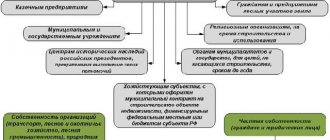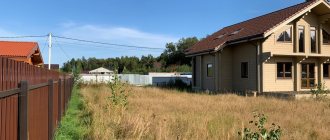The right of perpetual use: concept, features
The right of perpetual use (hereinafter referred to as BP) of a land plot (it is also called permanent use) is the ability to own and use a land plot (hereinafter referred to as land plot). To own means to define a land plot as one’s own, to say “this is my plot”; use - extract the useful properties of memory - build on it, grow, etc.
Features of BP law:
- the user and the owner of the site are not the same person; the one who received the plot on the right of BP is simply a user, but not the owner; the municipality that issued the plot remains the owner;
- the user cannot freely dispose of the site, i.e., determine its fate: sell, mortgage, donate, lease, etc.; The law prohibits all this, even if the owner has given permission to dispose of the site;
- the right of BP is not limited in time - you can use the memory constantly;
- there is no need to pay for the right of BP (the user only pays land tax);
- the circle of persons who can receive land plots on the basis of BP rights is limited;
- a special procedure for obtaining a lease on this right.
Construction is one of the possibilities for using the site with the right of perpetual use
Information about the right of BP is found in the Civil Code of the Russian Federation (Articles 268, 269), the Land Code of the Russian Federation (hereinafter referred to as the Land Code of the Russian Federation).
The legislative framework
Free, perpetual use of a land plot refers to real (property) rights. Land memory can be disposed of by entities authorized to do so by the relevant legal act. Article 39.9 of the Land Code of the Russian Federation defines the list of such persons:
- Enterprises formed by the Russian Government for operational management are unitary, state-owned.
- State bodies of the Russian Federation.
- Administrations of local municipalities.
- Centers related to historical heritage, which are under the jurisdiction of the President of the Russian Federation and have ceased to exercise their own powers.
The legislation allows a decision to be made on the transfer of land plots for indefinite use only by these persons (bodies). The form of the legal act was approved by the Ministry of Property of the Russian Federation in 2002 and is advisory in nature.
Article 5 of the Land Code of the Russian Federation defines a general list of entities that can participate in legal relations regarding the exploitation of plots:
- Direct owners of the territory.
- Landowners and land users.
- Persons holding easements.
- Tenants of real estate.
- Copyright holders.
Each of the listed categories, which have the opportunity to use or own land, has some differences.
Who is given the right to BP
Until 2001, anyone, including citizens and organizations, could obtain plots of land under this right. But in 2001, the RF Land Code was adopted. This code deprived private owners of the right of BP: in 2021, plots with the right of BP are given only to authorities (federal, regional, local), state and municipal institutions and enterprises. There are two reasons for this:
- The right to property rights is a relic of the Soviet Union, where there was no private property. In that system, the right of BP became an opportunity to legally own land. But in modern Russia there is private property, and why not use it. Moreover, users of a plot of land with the right of BP have limited rights compared to the owner (for example, they do not dispose of land plots).
- Create uniformity in the Russian system of relations regarding land. Some own plots on the right of BP, because they received it before 2001, others - on the right of ownership, since in 2002 there was no longer a BP right.
Accordingly, now citizens and organizations will be denied land plots on the basis of BP rights. But those who, before 2001, received plots on the right of BP, did not lose their rights and land plots. However, the new code made it necessary to re-register the BP’s right to ownership or lease. Ideally, by 2021, private owners should not have any plots left on the right of BP, because in 17 years you can not only re-register the plot, but also build a house there, plant a tree and raise a son. But there are still those who, for various reasons, did not re-register: problems with documents for the memory, there was no time, or they simply did not know.
My friends - a married couple - lived in the distant Moscow region (Voskresensk) and wanted to move closer to Moscow (to Zheleznodorozhny). To do this, they decided to sell their land plot and use the proceeds to buy an apartment (they couldn’t do it without a loan, but the money for the plot was also useful). They advertised and soon found a buyer. We concluded an agreement, took the money and went to Rosreestr to register ownership of the new owner. And in Rosreestr it turned out that my friends’ land was under the right of BP, which means they had no right to sell it. The contract was canceled, and the plot had to be re-registered as ownership. Only after this the plot was sold.
Lands that are given on the right of BP
By right, BPs can only transfer state or municipal land - land plots that belong to federal, regional or local authorities. A private owner - a citizen or an organization - cannot transfer his land on the basis of BP rights.
Now, land of almost all categories is transferred to government agencies and government institutions for permanent, unlimited use (Article 7 of the Land Code of the Russian Federation):
- agricultural;
- lands of populated areas;
- specially protected lands;
- forest fund lands;
- water fund lands;
- lands for industry and other special purposes.
These lands are transferred so that government agencies and institutions can fulfill the functions assigned to them. For example, nature reserves are managed by specially created state budgetary institutions. In order for management to be effective, the Ministry of Natural Resources and Ecology of the Russian Federation transfers the lands of the reserves to these institutions under the right of BP.
Private individuals received land for permanent use for agricultural work, construction of a residential building, and commercial use (running a business). Land plots still owned by citizens and organizations under the right of BP are located on lands that are free for circulation (not seized or limited in accordance with Article 27 of the Land Code of the Russian Federation). These are lands of such categories as lands of settlements, agricultural lands, and industrial lands. They are used as permitted by law: construction of residential and other buildings, maintaining personal subsidiary plots; gardening, plant growing, livestock breeding; operation of production facilities.
User Rights and Responsibilities
Memory user rights with BP rights:
- use the memory to the fullest extent, but do not break the law;
- use reservoirs (water quarries, ponds) and some common minerals (sand, clay) located on the site;
- construct buildings or structures, if this possibility is provided for in the documents for the land plot;
- engage in agriculture, if permitted;
- collect and use crops - all the fruits from working in the beds belong to the user of the memory.
Perpetual use gives the right to engage in agriculture on the plot if the law allows this activity for a specific plot
Let us remind you that the user of the land plot with the right of BP does not have the right to dispose of the site. The user cannot sell the plot, donate it, lease or rent it, mortgage it, or enter into any agreement regarding the plot. Only the owner of the site has the right to dispose.
Responsibilities of the user of the memory with the right of BP:
- use the memory in accordance with the purpose for which it is intended (lawyers call this “use for its intended purpose”); this purpose is usually stated in the documents for the land and can be different: construction of an individual residential building, agricultural work, gardening, etc., if you use the plot for other purposes or not use it, then the municipal authorities can take it away from you through the court (Art. 54 of the Land Code of the Russian Federation) or issue a fine (Article 8.8 of the Code of Administrative Offenses of the Russian Federation);
- preserve various signs: geodetic (needed for the work of surveyors, installed on behalf of government agencies), boundary signs (needed for measuring land, indicating the boundaries of plots);
- use the site safely for neighbors and without harm to the environment (for example, do not burn garbage in the yard);
- comply with fire safety rules;
- maintain the site in good condition (suitable for its intended use; for example, if it is an agricultural site, maintain the fertility of the land and prevent it from becoming overgrown with weeds);
- pay land tax on time.
Preservation of boundary signs is the responsibility of the land user
Reasons for refusal
In some cases, the procedure for transferring BP into ownership may be denied:
- The user did not properly register the plot in Rosreestr. It happens that lands are distributed, but are not registered in the Cadastre. In this case, the registration procedure must be carried out yourself with the participation of a cadastral engineer.
- There is no order to transfer the land plot for permanent use.
- There are unregistered permanent buildings on the territory (private house, commercial building, etc.).
- The land is the subject of an ongoing legal dispute.
- The applicant is not a full user and applies without a power of attorney. When contacted by a proxy, the document must be notarized.
Registration of BP rights: decision and agreement
At the moment, only government agencies and state and municipal institutions need information about obtaining the right to a business enterprise, since they still receive a right to use this right. Since 2001, private individuals have acquired land plots only for ownership and lease, but not as a business enterprise.
The scheme for obtaining BP rights for private owners and government agencies and institutions was similar (for the latter it has remained the same).
A person wishing to obtain a plot of land contacted the government authority (usually the municipality that owns the land plot) in the locality where he wanted to obtain the plot of land, with a request to provide it. The body considered this request and rendered a verdict: yes or no. If yes, then the authority adopted a special document - a decision to provide the land plot with the right of permanent (indefinite) use. Now for government agencies and institutions such a decision is made by a higher government agency. This decision is the basis that gives the right to use the site.
After the decision was made, an agreement on perpetual use was concluded with legal entities that requested a lease (now it is concluded with state and municipal institutions and enterprises). The contract states:
- who transfers the memory to whom;
- what memory is transferred: dimensions,
- borders,
- address,
- land category;
Ideally, after the decision and (or) agreement was drawn up, this right was also registered for the new person, but in the 90s it was difficult with registration, so it worked out how it worked. Nowadays the right to business activity is necessarily registered with an authority or institution. Registration is carried out by Rosreestr.
Video: professional commentary on the right of perpetual use
How to re-register the right of perpetual use
Citizens and organizations that received land plots on a BP right before 2001 are required to re-register their BP right to any of the two rights listed below:
- ownership;
- lease right.
The procedure for re-registration of BP rights
The procedure for re-registration of BP rights for citizens and legal entities. persons are the same . It is spelled out in Law No. 137 “On the entry into force of the Land Code of the Russian Federation” and boils down to the following.
- Find documents for the memory, check if everything is in order. Find out whether the plot is registered in the cadastral register and whether the BP right is registered. This means that the memory is listed in a special register, which also indicates who the user is. Registers and registers with Rosreestr. It will not be possible to re-register a land plot if it is not taken into account, because the state does not have information that this plot is yours. You can find out whether the storage unit is registered as follows:
- look for the plot on the Public Cadastral Map;
- didn’t find your plot on the map - contact Rosreestr: in electronic form - leave a request on the Rosreestr website in the “Public Services” section to receive an extract from the Unified State Register of Real Estate (USRN) about the main characteristics and rights to real estate or extracts from the EGRN about rights a specific person on real estate;
- personally - write an application for an extract.
- Draw up an application in which you ask to re-register the BP’s right to lease or ownership (the choice of right is at your discretion). The difference between them is in capabilities and cost. The owner uses and disposes of the land plot without restrictions, the tenant uses it, but does not dispose of it, since the municipality, which once gave the land for perpetual use, remains the owner. The owner is required to pay land tax, and the tenant is required to pay rent. What is more expensive and cheaper depends on the region.
- Take the application and all documents to the authority that provided you with the land on the right of BP. Most often this is a municipality, but there may also be state and regional authorities.
- Wait 1 month for the authority's decision.
- The decision has been made in your favor. If you requested a lease, the authority will enter into a lease agreement with you. To create ownership rights, a purchase and sale agreement will be concluded with you (if the plot needs to be purchased), after which ownership will pass to you. If there is no need to buy the plot, for example, when a house you built is located on it, then the municipality will simply decide to transfer ownership to you free of charge.
- Go to Rosreestr to register a new right (ownership or lease) to the site.
To find out whether the land plot is registered, you can request an extract from the Unified State Register of Rights to the land plot on the Rosreestr website
My neighbors began to re-register their plot. We collected the documents, wrote a statement and took it to the municipality. Belatedly - after a month and a half - a refusal to re-register came. They refused because the plot is not registered in the cadastral register, i.e. there is no information in Rosreestr about the boundaries of the plot or its area. History is silent about how memory cards were issued to neighbors 20 years ago. I had to register the plot: call cadastral engineers who measured the boundaries and drew a diagram of the plot, go with this diagram and a document confirming the right of BP (the municipality’s decision to provide a land plot) to Rosreestr. This entire process took approximately 3 weeks. After the cadastral registration, the documents were re-submitted for re-registration. A month later everything was successfully re-registered. If the neighbors immediately checked whether the land plot was taken into account, they would have spent two months instead of three.
By making a request on the Rosreestr website, you can find out about the rights of a particular person to a plot - this is another way to check whether the land plot is registered
Documents for re-registration
The documents are submitted along with the application to the authority that issued the loan. For re-registration you will need:
- passport;
- decision of the government authority to provide land plots on the basis of BP rights;
- agreement on the provision of land plots on the basis of BP rights (if concluded);
- an extract from the Unified State Register of Real Estate, which indicates where the plot is located and who owns it as a business owner;
- extract from the Unified State Register of Real Estate for buildings located on the site (if any).
Differences in the re-registration procedure for citizens and legal entities. persons
The only difference is the timing . Citizens can re-register their business license at any time; the law does not establish strict deadlines for this.
In order for legal entities to re-register their BP rights, the state has set a deadline of July 1, 2012. If there are linear objects on the site (roads, pipelines, power lines) - deadline until January 1, 2016. If a legal entity has not yet re-registered the land plot, then it can be fined up to 100 thousand rubles. (Article 7.34 of the Code of Administrative Offenses of the Russian Federation). Exceptions are country, gardening, and garage cooperatives of citizens. There was no deadline for re-registration for them.
Missing a deadline does not mean that a legal entity cannot re-register the right to a business entity. You just have to pay a fine before re-registration.
Failure Cases
The authority refuses to use the memory card in several cases:
- the BP right has not been formalized - there is no information in the real estate register that this plot belongs to the user on the BP right;
- buildings located on the site are not registered, for example, the user did not register the house and did not indicate himself as the owner;
- there is a court case regarding the site;
- The re-registrant does not have rights to the plot, for example, the use is registered in the name of the parents, but the children are trying to re-register.
Video: why it’s worth re-registering your business license in a timely manner
Procedure for provision
The owner of the site, in this case the local administration, makes a decision on granting or refusing. For territories transferred for free use, auctions are not held. Such issues are dealt with by a special unit in local governments called the municipal property management committee.
The procedure for re-registration of the authority of a BP
Possible reasons for the administration’s refusal to provide land for indefinite permanent use:
- the applicant did not submit all the necessary documents;
- erroneous or unreliable information is provided;
- the applicant is not an authorized person of the organization;
- The memory cannot be transferred (withdrawn from circulation, is not the property of the administration);
- the cadastral registration of the land was made with an error;
- There is a trial going on in this area or a court decision has already been made.
In order to provide an allotment to the BP, the committee must first find out information about land registration in Rosreestr. Depending on this, the procedure for submission and registration will vary slightly.
| Availability of data on the site in Rosreestr | The memory is in the Rosreestr database | The memory is not in the Rosreestr database |
| What do you need for registration? | send an application to the committee with a package of documents |
|
If the administration makes a positive decision, the legal entity independently carries out measures for cadastral registration and land surveying. The approval decision is valid for 2 years from the date of signing.
The process of registering BP rights for a territory consists of sending the following necessary documents to the district or city property management committee:
- statements in the form prescribed by law from a legal entity;
- confirmation of the rights of the authorized person;
- extracts from Rosreestr;
- passports for storage;
- extracts from the Unified State Register of Legal Entities on the validity of the organization.
The application can be submitted through the local MFC.
Termination of the right of perpetual use
If you have re-registered the BP right to ownership or lease, it will cease. The BP right also terminates if the user for some reason loses the plot . The site can “go away” in two ways.
- Forcibly. These are those cases when a plot of land is taken away (confiscated) from the user by a court or government decision. organ. According to the Constitution of the Russian Federation, it is impossible to deprive someone of the right to land just like that (“I don’t like this citizen” - it won’t work), therefore the laws spell out specific cases in which a court or authority can seize a plot:
- if the memory is needed for state or municipal projects (for lawyers - “needs”). For example, the site is located where the municipality plans to build a road; This means that your vegetable garden on the site (and your presence there) is interfering with construction. Therefore, the landfill will be confiscated in order to fully pave the road, and you will be offered monetary compensation for this;
- if the user of the site commits an offence. For any violation of the law, the state punishes, in our case, it deprives the BP and the site itself. Why it’s so harsh: the site is being used for other purposes; if the user received a plot for gardening, then it is not worth planting it with spruce and birch trees, creating a forest;
- the owner has brought the site to such a state that it cannot be used for its intended purpose; for example, if a storage facility is intended for construction, and the user has set up a landfill there or dug a quarry, and this now interferes with construction, then the storage facility will have to say goodbye;
- the user does not maintain the landfill in “good shape”, suitable for the normal use of the site for its intended purpose: if some unfortunate person received a cluttered site from the previous example, but for some reason he liked the landfill (probably the surname Plyushkin), and he is not going to clean it up , then they will find a better owner for the memory;
- the user does not restore the fertility of the land that people have damaged through their activities, does not plant plants that help the soil return to normal, does not carry out reclamation (this point applies to agricultural lands);
- the site is exploited in such a way that it is bad for the environment: the soil, a nearby body of water, plants and even neighbors; for example, chemicals are used as fertilizers on the property, which is why the soil has deteriorated and nothing grows on it anymore (and the neighbors can no longer breathe the chemicals and are moving away).
- Voluntarily. You can voluntarily renounce the right of ownership, and therefore the right to BP. Why - there are different situations: the land is actually not needed, but the tax is paid for it. To refuse, you need to write a statement about this and submit it to the MFC or the authority that issued the plot.
Video: application for termination of BP rights
Stages of re-registration of land ownership by individuals
If it is necessary to re-register land to individuals, a purchase and sale agreement is used to transfer ownership.
The action algorithm is presented in 5 steps:
- Collection of land documents.
- Organization of land surveying and determination of site boundaries.
- Register the plot according to cadastral registration.
- Payment of fees for registration actions.
- Transfer of the prepared package of papers to Rosreestr for property registration.
If the land was transferred to the property not to the owner of the plot, but, for example, to a garden or dacha society, in order to obtain documents for the allotment, they contact the administration with a request for a copy of the act of transferring the plot for use. The basis for the rights to such requests will be the presentation of the company’s participant book and documents on payment of fees (payments for security, electricity supply).
If it is necessary to carry out land surveying, contact the BTI or a special organization to carry out cadastral work and determine the perimeter. After receiving the plot map, they contact the Cadastral Chamber to obtain a passport.









